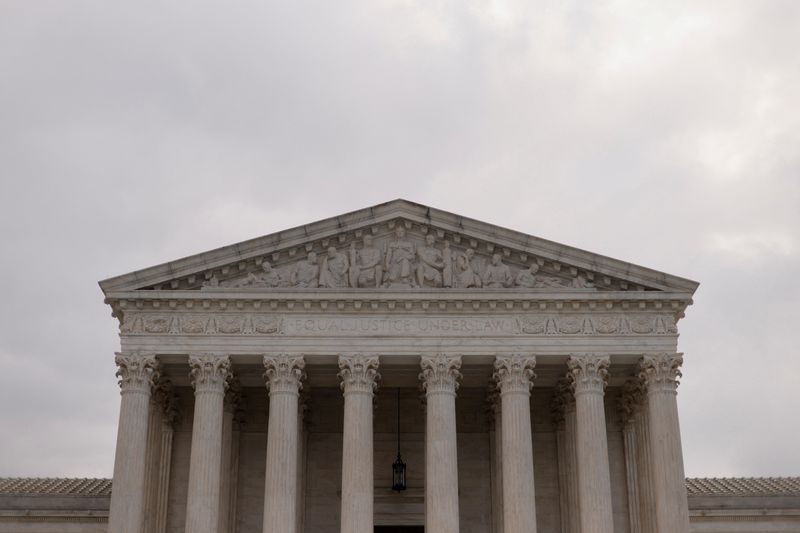U.S. Supreme Court backs public money for religious schools By Reuters

© Reuters. FILE PHOTO: A general view of the U.S. Supreme Court building in Washington, U.S. October 13, 2021. REUTERS/Jonathan Ernst/File Photo
By Andrew Chung
(Reuters) -The U.S. Supreme Court on Tuesday allowed more public funding of religious entities in an important ruling in favor of two Christian families who challenged a Maine tuition assistance program that excluded private schools that promote religion.
In the latest in a series of decisions in recent years expanding religious rights, the justices in a 6-3 decision overturned a lower court ruling that had rejected the families’ claims of religious discrimination in violation of the U.S. Constitution, including the First Amendment protection of the free exercise of religion.
The court’s conservative justices were in the majority in the ruling, authored by conservative Chief Justice John Roberts, and its liberal members in dissent.
The decision builds upon the Supreme Court’s 2020 ruling https://www.reuters.com/article/usa-court-religion-idINKBN2412HY in a case from Montana that paved the way for more taxpayer dollars to flow to religious schools.
Maine provides public funds to pay for tuition at private high schools of a family’s choice in some sparsely populated areas of the northeastern state that lack public secondary schools. The schools receiving this tuition assistance under the program must be “nonsectarian” and are excluded if they promote a particular religion and present material “through the lens of that faith.”
Roberts faulted the state’s program, which he said “operates to identify and exclude otherwise eligible schools on the basis of their religious exercise.”
The ruling offered the latest example of the Supreme Court, with its increasingly assertive conservative majority, making the expansion of expanding religious liberty a high priority in recent years. The justices have been receptive to claims made by plaintiffs – often conservative Christians – of government hostility toward religion including in the educational context.
The families in the Maine case sought taxpayer dollars to send their children to two Christian schools that integrate religion into their classrooms and have policies against gay and transgender students and staff. The First Amendment also prohibits government endorsement of any particular religion.
SEPARATION OF CHURCH AND STATE
Conservative and religious advocacy groups in recent years have been seeking through the courts more access to public funding for religious education, including through voucher or tax programs giving parents choice outside public school systems. As the Supreme Court narrows America’s separation of church and state, critics have said such rulings risk entangling government and religion in ways that the Constitution was crafted to prevent.
Liberal Justice Sonia Sotomayor wrote in dissent: “Today, the court leads us to a place where separation of church and state becomes a constitutional violation.”
President Joe Biden’s administration backed Maine in the case, as did public school boards and teacher unions. Maine has said it excludes certain private schools from the tuition assistance program because they would use public funds to promote religious beliefs.
The Supreme Court’s 2020 Montana ruling, which involved an educational tax credit, prevented states from disqualifying schools from public aid based on their religious status or affiliation. The Maine case went further, with the possibility looming of requiring states that subsidize private education to also fund religious activities.
Two sets of parents – David and Amy Carson, and Troy and Angela Nelson – sued Maine in 2018.
The Nelsons have said they wanted to use the tuition aid to send their son to a Christian school called Temple Academy in Waterville, but instead used it to send him to a secular private high school. The Carsons have said they paid out-of-pocket to send their daughter to Bangor Christian Schools in Maine’s third-largest city.
The two schools describe themselves as seeking to instill a “Biblical worldview” in students, according to court records. They refuse to hire gay teachers or admit gay and transgender students. Bangor Christian Schools teaches that a “husband is the leader of the household” and includes a class in which students learn to “refute the teachings of the Islamic religion with the truth of God’s Word.”
The Boston-based 1st U.S. Circuit Court of Appeals ruled against the families in 2020.
The families were represented by the libertarian legal advocacy group Institute for Justice.
Powered by its conservative majority, the Supreme Court in recent years has expanded individual and corporate religious rights while reducing the separation between church and state.
In another case involving government funds, the court in 2017 found that churches and other religious entities cannot be flatly denied public money even in states whose constitutions explicitly ban such funding. The case involved a church that was denied access to a Missouri grant program that helps nonprofit groups make playground improvements.
In other religious rights rulings this year, the justices on May 2 backed a Christian group that sought to fly a flag emblazoned with a cross at Boston city hall and on March 24 directed Texas to grant a convicted murderer on death row his request to have his Christian pastor lay hands on him and audibly pray during his execution.
For all the latest Business News Click Here
For the latest news and updates, follow us on Google News.
